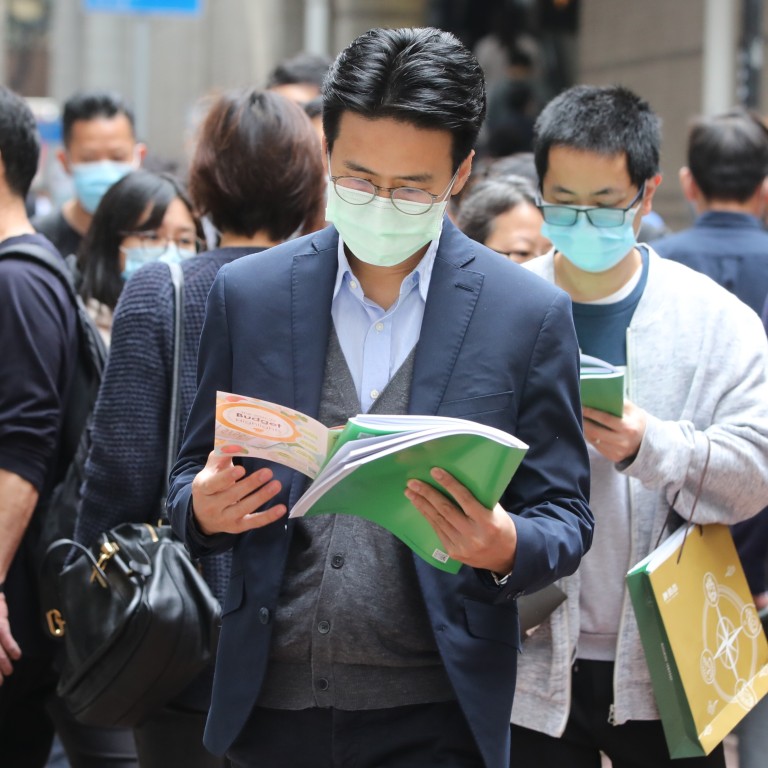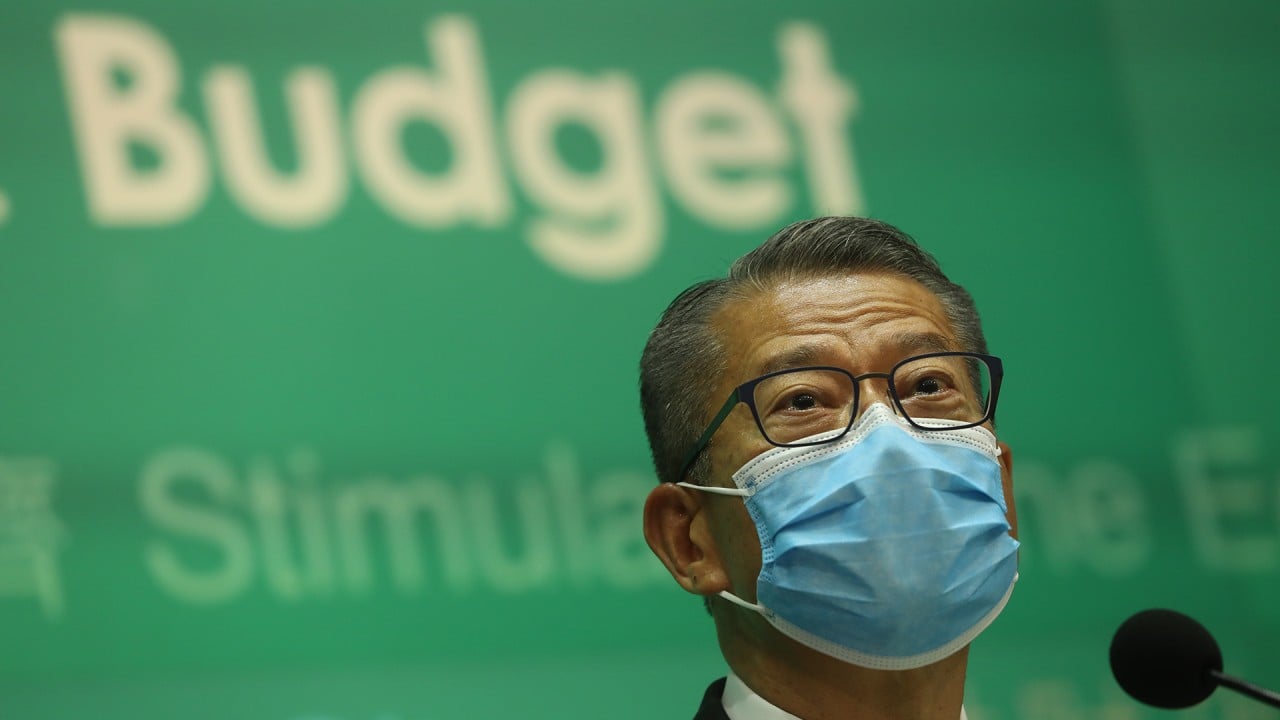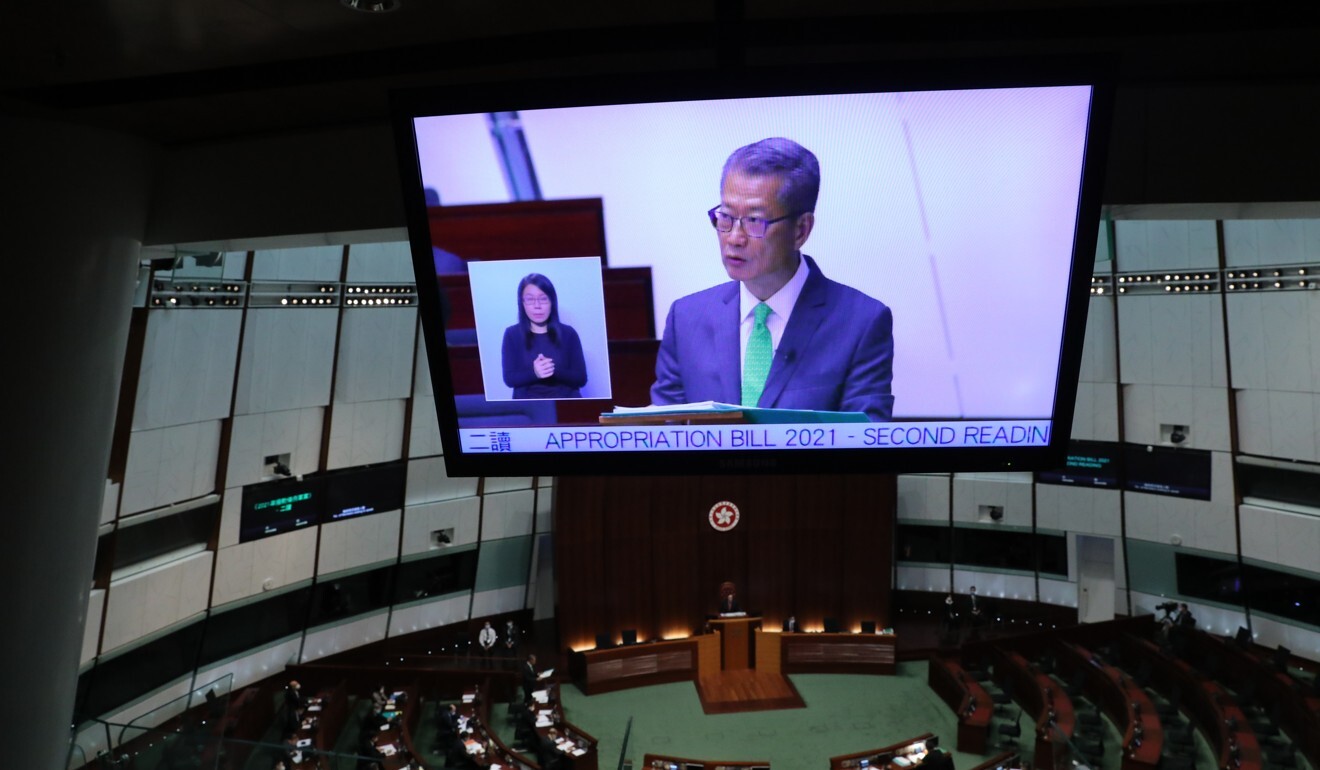
Hong Kong budget: what did finance minister Paul Chan do right and why are pro-Beijing lawmakers still grumbling?
- Business leaders welcome stamp duty increase and safeguarding city’s future as financial centre
- But while politicians applaud HK$5,000 spending voucher, some bemoan lack of sweeteners for middle class
“This budget addresses our three most pressing needs: supporting the people and businesses who have been worst affected by Covid-19; safeguarding our standing as a premier financial, business and tourism centre; and laying the foundations for new innovation-led growth,” Peter Wong Tung-shun, chairman of the Hong Kong General Chamber of Commerce, said.

03:43
What Hong Kong’s 2021-22 budget means for residents of the city
But Liberal Party leader Felix Chung Kwok-pan said it was not enough.
“The government must do more to support employment and enterprises, so that when more people get vaccinated, they can spend money with the vouchers and create a multiplier effect and get the economy going again,” he said.
Calvin Tai, interim chief executive of the Hong Kong Exchanges and Clearing Limited (HKEX), said the government did not consult the exchange before making the proposal.
But while Tai said he was disappointed by the decision to raise the stock transaction stamp duty, he added he understood it was an important source of government revenue.
The Hang Seng Index closed at 29,718.24 on Wednesday, dropping 914.4 points compared to the day before – marking the largest single-day plunge in nine months.
I believe that more than 2 million local investors, as well as mainland investors, would find the secretary’s decision unacceptable
“My sector is strongly against this,” said financial services sector lawmaker Christopher Cheung Wah-fung. “I believe that more than 2 million local investors, as well as mainland investors, would find the secretary’s decision unacceptable.”
But legislator Wong Ting-kwong, deputy chairman of the Legislative Council’s Panel on Financial Affairs, supported Chan’s proposal.
“Let’s wait for a week, and see if local stock transactions remain strong,” he said. “Asian and European markets were not doing well either, so it’s not fair to say the Hang Seng Index plunged because of this.”
Wong said increasing stamp duty was “a choice when there is no choice”, as the economic and political cost of increasing revenue through other means would be greater.
“What other industry has been doing better amid this global pandemic?” he asked.

Chung agreed with Cheung, saying the increase in stamp duty was a proposal raised by his party.
“My party won’t encourage the government to increase tax rates, but this is a way that guarantees that you can quickly see the increase in revenue, and the impact is minimal,” he said.
Chung also praised the finance minister for adopting his party’s proposal to issue electronic consumption vouchers. Chan’s plan is to issue HK$5,000 (US$645) in digital coupons, in instalments, to each eligible Hong Kong permanent resident and new arrival aged 18 or above to stimulate local consumption.
“I am just worried about the implementation. There are always hiccups when this government rolls out new things,” the lawmaker said.
Tommy Cheung Yu-yan, the Liberal Party chairman, gave the budget high marks, saying the e-vouchers could provide incentives for small businesses to switch to digital payments, minimising physical contact during the health crisis.
Officials quiet on how HK$8 billion for national security will be spent
Regina Ip Lau Suk-yee, chairwoman of the pro-establishment New People’s Party, also welcomed the vouchers, and hoped they were delivered in such a way that small businesses, instead of large enterprises, would benefit.
“But we are disappointed about the reduced sweeteners for the middle class. They also faced financial hardships amid the epidemic,” she said.
Starry Lee Wai-king, chairwoman of the Democratic Alliance for the Betterment and Progress of Hong Kong, believed Chan could have done more for the unemployed.
Rather than handing out cash for the jobless, the financial secretary pledged to set up a special 100 per cent loan guarantee for affected individuals, with the loan ceiling set at HK$80,000 for six months.
“Offering loans to them is never the best solution,” Lee said. “It will only incur debt or may lead to abuse. I hope the government won’t close the door to cash subsidies.”

Federation of Trade Unions lawmaker Kwok Wai-keung agreed. He said even though Chan deserved credit for giving out some sweeteners to the underprivileged, the federation would continue to press the government on offering more financial assistance to those who lost their jobs.
Opposition activist Lo Kin-hei, chairman of the Democratic Party, also said he found it contradictory for Chan to emphasise the importance of finding new sources of revenue, while reducing support for the underprivileged.
“Our administration has a system in place, and the ability to hand out cash, which is the simplest and most direct way to help the people,” he said. “Chan did not want to do more to help the unemployed, so what is that extra money from stamp duty for?”
Public works spending to fuel growth but full recovery will take time, say economists
A government source said officials had considered creating new drivers of the economy, new taxes and reducing relief measures as the three ways to improve public finances.
Their conclusion, the insider added, was that stamp duty was the only possible way forward at this stage, because it was not the right time to increase salary and profit tax.
Chinese University political scientist Ivan Choy Chi-keung said Chan had delivered a relatively measured budget this year. While the finance chief stopped short of providing cash handouts to score points with the public, he nevertheless proposed other schemes, such as the e-vouchers and small loans for the unemployed, in a bid to pacify pro-establishment lawmakers.
Choy believed the central government would be content with Chan’s budget.
“The rules have changed in which Beijing might not be concerned whether the budget impresses the public. Instead the central government simply hopes it does not have to worry about Hong Kong,” he said.
Additional reporting by Lilian Cheng
Editor’s note: Comments from Hong Kong Exchanges and Clearing Limited were amended after they clarified their position.


